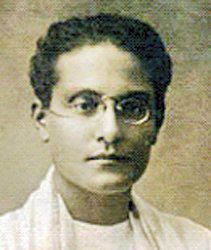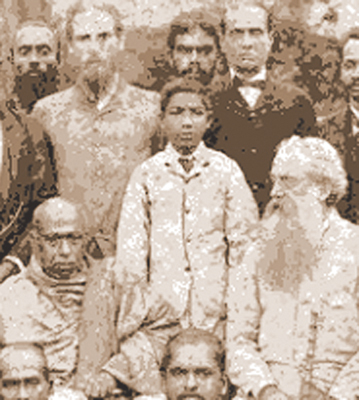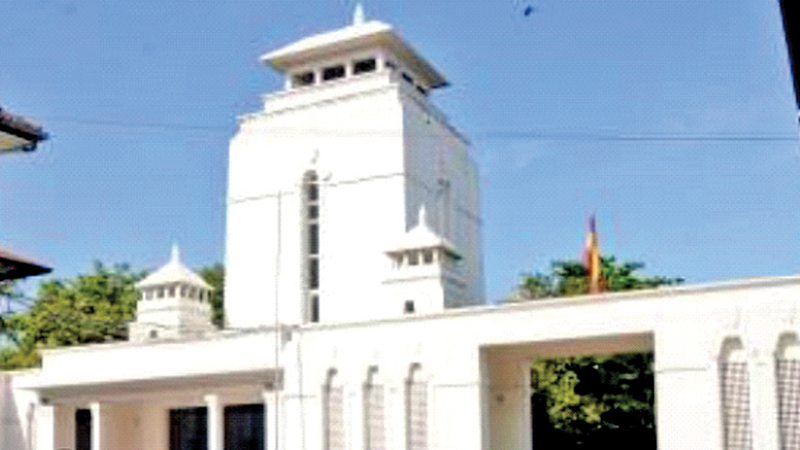Ananda College, Colombo, stands as a bastion of Sinhala Buddhist educational legacy and its roots have descended from a long-standing battle in the colonial past of the island. Its products have held the helm from the military to the cricket in this nation. It is not an exaggeration to state Ananda is known as a brand for preserving the Sinhalese Buddhist identity in the country.
However, it is a surprising factor to reveal that the same school, which has been legendary for its intrinsic Sinhalese Buddhist ideology produced a very peculiar character as one of its very first students when the school was established in 1886 and the same student later became one of its Vice Principals.
 Curuppumullage Jinarajadasa was indeed a man for all seasons. The main reason his name becomes sui generis is the way he went beyond the conventional education that he received and went on to become an internationalist through his works on theosophy. He can be regarded as one of the first Ceylonese who travelled around the world to become a prominent academic in an era where people of brown skin were disdained. His legacy is still prevalent among the theosophists abroad as an internationalist though his memory is being forgotten in Sri Lanka including the school where he spent his boyhood.
Curuppumullage Jinarajadasa was indeed a man for all seasons. The main reason his name becomes sui generis is the way he went beyond the conventional education that he received and went on to become an internationalist through his works on theosophy. He can be regarded as one of the first Ceylonese who travelled around the world to become a prominent academic in an era where people of brown skin were disdained. His legacy is still prevalent among the theosophists abroad as an internationalist though his memory is being forgotten in Sri Lanka including the school where he spent his boyhood.
Curuppumullage Jinarajadasa was born to a Sinhalese family in Panadura in the late 19th century. The Buddhist religious revival movement was looming in Ceylon at the time as a result of the Panadaura debate, which took place just two years before Jinarajadasa’s birth in 1875 and the wave of Panadura debate finally reached the West, which brought Henry Steel Olcott, Helena Blavatsky and many more theosophists to the island in search of Wisdom of the East.
Though the real motives of Olcott and Blavatsky have been subjected to much criticism today, the pivotal factor which we cannot forget is the hallmark legacy left by them in organising a local Buddhist education in English medium as a resistance to the Colonial education, which was in the climax of 19th century Ceylon. Jinarajadas’s association with theosophy began at the age of 13 when C. W. Leadbeater was in Ananda College. Leadbeater was another Orient-loving Englishman who came to Ceylon after renouncing his own faith in Anglicanism as a result of his growing interest in occultism and theosophy. In Ceylon, he became the first principal at Ananda College then known as the English Buddhist School in Pettah founded by the Buddhist Theosophical Society.
Jinarajadasa and Leadbeater
Jinarajadasa was sooner attached to the teachings of theosophy when he was at Ananda as one of the first students during the Leadbeater period after completing a few years in Ceylon. Leadbeater accompanied Jinarajadasa to England, where Leadbeater was given a task to teach a son of an English aristocrat. Tutoring at home was a frequent custom among the English elite class in Victorian England and somehow Leadbeater was witty enough to twist the arm of his patron to grant a chance for Jinarajadasa to study with his son.
The diary of Henry Steel Oclott indicates Leadbeater firmly believed that he would meet the brother of his previous birth in Ceylon and he trusted it was Jinarajadasa who happened to be his brother in a previous life. This perception led to the good fortune of Jinarajadasa in England. He excelled in his studies in Oriental language at St. John’s College, Cambridge and coxed for the prestigious Cambridge Rowing crew. He may be one of the first few Asians who were involved in a sport, which was exclusively reserved for the British elite in the 19th century.
Leadbeater provided every opportunity for him to gain the advantage of occidental education. After completing his Bachelor’s in Classics from Cambridge, Jinarajadasa went on to read his postgraduate studies in European Literature at Pavia University. In London, he met Madam Blavatsky and became a member of the International Theosophical Society. In 1901, Jinarajadasa came back to Ceylon to serve as the vice principal of his school Ananda College, but within a year he went back to Europe.
The real decorated life of Jinarajadasa began after he reached Europe as an academic of the Theosophical Society. Theosophy was widely becoming popular among the radicalised youth in the West in the first decade of the 20th century, which provided a larger space for Jinarajadasa to continue his lectures in the West. His fluency in various European languages gave him more access to spread theosophy. His charisma was noticed by Annie Besant the prominent English social activist in British India whose contribution was pivotal to establishing the Indian National Congress.
Besant urged young Jinarajadasa to join the administrative tasks of the Theosophical society. Many in Sri Lanka including the alumni of schools established by the Theosophical society assumed Theosophy is directly related to the teaching of the Buddha as Olcott and Madam Blavatsky were presumably devoted Buddhists. In truth, they never embraced Buddhism as the ultimate faith and Buddhist teachings were adhered to only as fragments to the practice of Theosophy.
Blavatsky’s idea of Theosophy was essentially confined to seeking the ultimate truth of every religion. The influence of Theosophy was a predominant factor in Jinarajadasa’s career as a lecturer in Theosophy in the West, moreover, his liberal attitude acquired from studying at Cambridge and the admonition of his teacher Leadbeater helped him to sustain himself in the Western world. This factor was proven when he married an English woman called Dorothy Graham and decided to spend the rest of his life abroad as a full-time Theosophy master.
Mysticism
Jinarajadasa was fascinated with the notion of mysticism in world religions, which he saw as a cardinal factor in understanding wisdom. In his travels to South America and the United States, he frequently emphasized the universality of love and man as an expression of divinity. It is an ironic incident that though Buddhists vehemently decline the concept of a creator God, Theosophists did not find it contradictory with their faith.
Jinarajadasa’s writings on the universality of every religion did fit the audience in the West, even though it was a complete misfit in his country. His predilection for modernity inspired him to introduce American Baseball in India during his tenure as the President of the Theosophical Association in Adiyar, India.

Jinarajadasa with Leadbeater and
Ven. Sumangala Thera
Being a fan of American Baseball, he took a keen interest in spreading it among the Indian youth in Adyar. However, Jinarajadasa could not endure the Indian summers, which deteriorated his health day by day and finally, he and his wife left for the USA without contesting for the second term of the Theosophical Society.
In the USA, Jinarajadasa was supposed to deliver a series of lectures on theosophy. But even before he started the series, he passed away in the American Lodge of the Theosophy Society in Illinois. A memorial service was held in the library, and all of his ashes were scattered on the Fox River by his long-standing friend and fellow Theosophist James S. Perkins.
The mystery remains unsolved as to why Jinarajadasa is completely detached from Ceylon. No evidence can be found in his works written during his stay in India that he felt nostalgic about staying away from the island he was born in. In an interview given by him to the American Theosophist magazine in 1928, Jinarajadasa admitted only four personalities have profoundly influenced him in shaping his intellect. They were German composer Richard Wagner, Plato, Dante and 19th century great English literary critic John Ruskin.
In the recently published Sinhala book by Narada Karunathilake, the author has tried to prove how Olcott and Blavatsky wanted to create a separate ideology while pretending to be the guardians of Sinhalese Buddhism from colonial oppression. The book has further critiqued the upbringing of Jinarajadasa in his childhood, which eventually led him to be an internationalist despite having studied in a school formed for the cause of Sinhalese Buddhist identity in the colonial past.
Deconstructing the character of Jinarajadasa is a difficult task for modern-day historians. Nevertheless, his aura as an international scholar went beyond the island he was born and perhaps Jinarajadasa can be regarded as the second widely claimed Ceylonese scholar in the West after Ananda Coomaraswamy in the colonial past. A few years before his demise, he wrote his epitaph, which embodied the ethos he stood for.
He loved children, the sea,
Beethoven, Wagner’s Ring, the
Hallelujah Chorus, and his
Gospel was Ruskin.
The writer is a lecturer at the Department of International Law, Faculty of Law, General Sir John Kotelawala Defence University.









